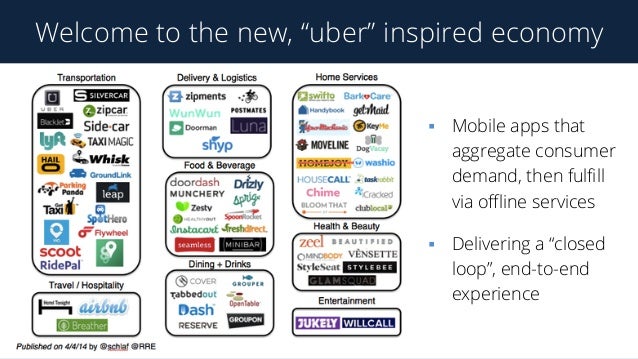2016: The Year of Uberification?
 Happy New Year! It’s 2016 already, and we’re already in the future – not the glorious Space Odyssey or Back to the Future future, but still, some approximation thereof. One of the signs 2016 is going be a very futuristic year, is the ongoing process of ‚uberification’ sweeping the business world. Read on to find out all about it!
Happy New Year! It’s 2016 already, and we’re already in the future – not the glorious Space Odyssey or Back to the Future future, but still, some approximation thereof. One of the signs 2016 is going be a very futuristic year, is the ongoing process of ‚uberification’ sweeping the business world. Read on to find out all about it!
So, what exactly is ‚uberification’? In case you’ve been hiding under the rock these past few years, it’s a way of making a service business more user-friendly by emulating the business model adopted first by Uber, a ride-sharing company that’s recently had its 1 billionth ride. You read that correctly, that’s billionth with a „b” – Uber’s app was used 1 000 000 000 times to hitch a ride since its inception, marking a new dawn for an industry that had stayed nearly unchanged since the last century. Even though taxi industry is unique in many aspects, other companies can benefit from the way Uber does business by following a few key rules. But let’s start at the beginning…

Uber started its revolution by making taxi service completely mobile. It’s enough to tap or swipe on the smartphone’s screen to use the app and „hail” a ride, summoning the closest available driver to you as fast or faster than any traditional yellow cab via phone or the Internet. You set the route in advance and the fare is estimated ahead of time, so when you get in an Uber car everything is already arranged. Users are also able to rate and recommend their experience, creating a positive (or negative) word of mouth for the service and the particular driver after taking a ride. As such, the classic cab companies were outdone on every front: the service is as easy to use, drivers come faster, rides cost less. What’s not to like? Well, unless you’re a cabbie who had to undergo strict testing and earned their cab medallion the hard way…

Despite outrage of the classic cab industry and the eternal tug-of-war with legislation, as a company, Uber clearly is doing something right. And you are bound to ruffle quite a few feathers if you turn the whole idea behind your industry’s main business on its head and offer both the passenger’s seat and the wheel itself to everyone who wishes it, which is exactly what Uber – „the taxi replacement company” – did.

As a system, Uber offers the same easy-to-use service to aspiring drivers. It’s also much easier to qualify for and become a registered Uber driver than a licensed cabbie. Flexibility is king; you accept hails via the system only (not from the street) and work your preferred hours. In addition, everything from meters to receipts is handled for you by the system. So if you’re of legal age, all you need to have is a driving licence, a good driving history and a clean bill of health, and you’re all set. You don’t even have to own a car or a smartphone (both of which can be leased by Uber) to start earning money.
 |
| Uber CEO, Travis Kalanick |
Though, clearly, this is still not a fully regulated matter as far as employment and taxation goes, drivers can (and do) earn substantial amounts of money performing a service when they want to, not when they are scheduled or required to in a typical taxi service. Uber is thus a really well thought out business scheme for connecting drivers with passengers, itself earning a pretty coin out of every transaction. But even with that payment taken into account, the rides still cost less than a typical cab fare. Combine it with a very handy hailing app for passengers and freedom to work when you want for a good wage for drivers, and you’re on to a real winner.

It’s all the rage nowadays, but not everyone thinks that all parts of the Uber model should be replicated. One criticism levelled at Uber as recently as yesterday involves the so-called „surge pricing”, a business-intelligence policy that hikes service fee depending on current demand for it. Uber’s closest rival, US-based Lyft, is famous for employing this strategy as well. According to recent Facebook posts, the fares can get outrageously high, and some sources say a USD 10 ride can cost upwards of USD 50 come New Year’s night. Even though Uber puts services like UberPool (find others who also want to go the same way and share a Uber cab together to cut the fare in half) and fare estimate (which tells you how much it will cost to use an Uber cab before virtually „hailing” it) front and centre, people still think the policy is not the most ethical one. After all, traditional yellow cabs do not charge extra just because there’s a lot of customers currently clamouring for a ride.

These are just several of the recurrent criticisms of the so-called „sharing economy”. This new model of doing business has emerged a few years back in tandem with what is now referred to as ‚collaborative consumption’ services. In a nutshell, within a sharing economy participants help shape the market by voicing their opinions and driving the demand or supply directly. There’s also little distinction between a service provider and service consumer, since in many instances, a customer can become a provider and vice versa.
In essence, this is the best term to describe the uberification of existing businesses, as instead of creating a company which is then clearly separated from its consumers by the „invisible hand of the market”, the new model makes everyone a participant as well as beneficiary of the service.
A good example of this new trend is AirBnB, the private accommodation service where anyone can book a place to stay with a private host. The system is used by all the parties involved as a payment intermediary, the means to assess and promote the host’s service and as an easy way to find a place to stay. The sharing part comes into play when you recommend or criticize the host’s service, making them respond by improving their accessibility, quality, prices etc. or risk being removed from the service due to lack of popularity. There’s a real incentive to offer quality service, because when numerous participants have similarly negative opinions, very few new guests will pick this particular offer.

Aside from the collaborative consumption and shaping the market directly, the registered users of the system can become hosts with consummate ease, reciprocating a service they have been offered by others. This is very similar to the Uber model, where anyone can become a driver (and still be able to also avail of the service when not providing it). Similarly, AirBnB takes a cut of every transaction as well, but even factoring in this payment the prices are very competitive — and set by users in real time. While this means freedom from legislative or „market average” restraints, it also means no-one curtails rampant price hikes. Like Uber drivers, AirBnB hosts can raise their prices when they see the demand spike, such as during the summer or for major holidays. This is why AirBnB has also been under fire from those that offer their services (in this case, accommodation) at a set rate in hotels, motels or guest houses. Clearly, there’s pros and cons to lack of explicit oversight, but that doesn’t mean the model itself is not valid, as there’re already hundreds of businesses created with similar philosophy in mind.
So how do these companies „uberify” themselves? What do they do to replicate Uber model to really take off in the sharing economy? Well, it seems that Uber, AirBnB, Lyft and many others have perfected the three key concepts that set them apart from the pack in business terms.
Tap to Order
The most important thing to remember is that their service is very easy to use and ALWAYS available. It has to be as on-demand as possible, period. In case of Uber, their app gives you the most important info at a glance and don’t require more than a few taps or swipes to arrange for a ride, which, you guessed it, is always available. Payment is likewise as easy and is processed over a mobile payment system in a closed infrastructure – you never have to leave the service (app or service website). In addition, in other similar services, many transactions can be done electronically even before entering the point of service, so you can use a plethora of methods to pay for the service even in the absence of the NFC-enabled smartphone or credit card. Ease of use to find, obtain and pay for the service is tantamount to being the go-to service provider or becoming just another failed start-up. Therefore, making your service easy to use (and as on-demand as possible) is an absolute must.

Reputation is Everything
As this is a collaborative consumption, your customers are no longer anonymous, faceless numbers. Each user can promote your brand (or potentially badmouth it), so they have to be able to provide feedback just as easily as they can use your service — or they will not use it. You need to be democratic about your service and put a clear, transparent rating system in place for every participant to be able to assess a particular service provider. It needs to be safe from tampering and deliberate down-ranking or boosting the rank, the two practices now increasingly used by dishonest competitors in sharing economies. Both practices are hard, but not impossible to weed out. The cleaner and easier ranking system is to use, the better for everyone involved. For example, in Uber, a driver’s ranking is used to find dependable, safe drivers. In AirBnB, you can check if the host’s house is clean and the advertised amenities in order before choosing the host’s offer.
Make no mistake though; even if your app is easy to use for all involved, and there’s a rating system in place to promote the best users, there’s still one crucial factor missing to fully uberify your company.

Freelancers, not Lifers
In a sharing economy, the roles of customer and service provider are blurred by design, but that does not (nor should it) mean that everyone is both a recipient and giver of service. In Uber that would actually be impossible: not everyone has a driver’s license or is even allowed to drive… But nearly everyone at one point or another will have a need of a cab. Likewise, not everyone can become a host on AirBnB, but a very large number of people travel and require a place to stay.
Nevertheless, the possibility to „go pro” exists and is prominently offered to every user. Some uberified companies have less formalities to go through before you can offer your services, some more; what is common is that it’s a lot easier to do than any competitive service offering in a classic, bricks-and-mortar economy. And most people who enlist can make it their life’s calling, but are not required to. In fact, the sharing economy relies on its service providers’ flexibility and allows for it.
For many freelancers, this is a huge deal: they can organize their work without sacrificing other streams of income or other obligations. This is an incentive to do this and offer your services independently at the same time. As a driver in Uber, or host in AirBnB, for example, you can start and end your „shift” whenever you wish. Unfortunately, there already have been some signs that if you do not offer your service every time it’s needed, you may be treated a little differently. This suggests that uberified models may still punish laziness or lack of availability, much like classic service models. This may potentially discourage freelancers who rely on many revenue streams for a living.

But if your aspirations are a cut higher and you want to create your own system of that type (not just participate in an existing one), remember: you don’t actually earn most of the money by offering a creative service. It’s not about the product anymore but about letting others refer it further and spread it across multiple locales and communities. It can be something incredibly mundane, like hailing a cab, but if it’s done right, it can earn you billions. You make it successful not by finding something no-one has done before, but by making it easier to do something that everyone is already doing… Just not in a uberified way!

And that’s why there’s a huge list of uberified businesses already operating. From walking your dog, to painting your home, the list of Uber-like services is endless. The biggest draw to a fledgling entrepreneur has to be this: unlike the traditional service, you do not have to recruit and train your customer-facing staff, nor the production facilities. All you need to take care of is the infrastructure, or the system itself, and the sharing economy will take care of the rest. So what are you waiting for? Make an app, hire people to maintain it and start making money hand over fist… If you’re too scared, perhaps there’s already a uberified company that offers an app to start a uberified business for you?
VOCABULARY
glorious – cudowny, wspaniały
approximation (of sth) – przybliżenie, tu: coś, co przypomina coś sobą
thereof – tego, z tego
ongoing – trwający
to sweep sth – szerzyć się (w czymś), przetaczać się (przez coś)
to be hiding under the rock – tu: świata na oczy nie widzieć, siedzieć w głuszy/na pustkowiu
user-friendly – przyjazny dla użytkownika
to emulate sth – naśladować coś, kopiować
to adopt sth – przyjąć coś, zaadoptować
ride-sharing – wspólne przejazdy autem, podwożenie (kogoś za pieniądze, np. w ramach systemu Uber)
to hitch a ride – złapać stopa, tu: zawołać taksówkę
inception – założenie, powstanie
to mark sth – zwiastować coś, sygnalizować
industry – przemysł, branża
unique – unikalny, niezwykły
to benefit from sth – skorzystać na czymś
to follow sth – podążać za czymś, przestrzegać czegoś
to tap – dotknąć/puknąć (ekran dotykowy)
to swipe – przeciągnąć palcem (po ekranie dotykowym)
to hail (a taxi) – zawołać, przywołać (taksówkę)
to summon – przywołać
cab – taksówka
via – za pośrednictwem
route – trasa
in advance – zawczasu, przed (czymś)
fare – opłata za przejazd
to estimate – oszacować, podać w przybliżeniu
to arrange – zaaranżować, ułożyć
to rate – ocenić
word of mouth – opinia przekazywana z ust do ust
to outdo sb – przebić kogoś, być lepszym od kogoś
cabbie – taksówkarz (pot.)
to undergo sth – poddać się czemuś, przejść przez coś
to do sth the hard way – ciężko na coś zapracować, zrobić coś kosztem dużego wysiłku
despite – pomimo
outrage – wzburzenie, oburzenie
eternal – wieczny
tug-of-war – zażarta rywalizacja, przeciąganie liny
to be bound to do sth – z pewnością coś zrobić
to ruffle sb’s feathers – działać komuś na nerwy
to turn sth on its head – przewrócić coś do góry nogami
aspiring – początkujący
flexibility – elastyczność
in addition – co więcej
meter – licznik
receipt – rachunek, paragon
to handle sth – zająć się czymś
to be of legal age – być pełnoletnim
driving licence – prawo jazdy (UK)
clean bill of health – świadectwo zdrowia
you’re all set – wszystko załatwione, wszystko gotowe
taxation – opodatkowanie
as far as sth goes – jeśli chodzi o coś
substantial – pokaźny, spory
to perform sth – wykonywać coś
to schedule sth – zaplanować coś
thus – zatem
well thought out – dobrze przemyślany
scheme – projekt, plan
pretty coin – niezły kawał grosza, niezły grosz
to take sth into account – brać coś pod uwagę, wliczać coś
to combine sth with sth – połączyć coś z czymś, brać coś wraz z czymś
handy – poręczny, przydatny
to be on to a real winner – wytypować zwycięzce, postawić na właściwego konia
sth is all the rage – coś jest krzykiem mody, coś jest ogromnie popularne
nowadays – obecnie
to replicate sth – powtórzyć coś, skopiować
to level criticism at sb – skrytykować kogoś, skierować krytykę pod czyimś adresem
so-called – tak zwany (tylko przed rzeczownikiem)
surge – nagły wzrost, duża podwyżka
business intelligence – wywiad gospodarczy, tu: śledzenie trendów popytu/podaży
to hike sth – podwyższać coś
fee – opłata
depending on sth – w zależności od czegoś
demand for sth – popyt na coś
according to sth – zgodnie z czymś
outrageously – oburzająco
upwards of X – powyżej X
…come X… – gdy nadejdzie/nadchodzi X
to put sth front and centre – wyraźnie coś pokazać/zaznaczyć, postawić coś na pierwszym miejscu
to charge extra – wymagać dodatkowej opłaty, żądać więcej (pieniędzy)
to clamour for sth – głośno się czegoś domagać (pot.)
recurrent – powtarzający się
to emerge – pojawić się
in tandem with sth – w parze z czymś
to be referred to as X – być określanym mianem X
in a nutshell – krótko mówiąc, pokrótce (pot.)
participant – uczestnik
to voice sth – wyrazić coś
to drive sth – napędzać coś
supply – podaż
distinction – różnica, podział (między kimś/czymś)
instance – wypadek, przypadek
term – pojęcie, nazwa
existing – istniejący
beneficiary – odbiorca, ktoś, kto korzysta na czymś
accommodation – kwatera, nocleg
to book – zarezerwować
host – gospodarz
party – strona (umowy, działalności itp.)
intermediary – pośrednik
the means to do sth – sposób na zrobienie czegoś
to assess sth – ocenić coś
to come into play – wejść do gry
to respond – zareagować
to improve sth – poprawić coś
to remove – usunąć
due to – z powodu
numerous – liczny
consummate – doskonały
to reciprocate sth – odwzajemnić coś
to avail of sth – skorzystać z czegoś
to take a cut of sth – wziąć dolę czegoś (opłaty)
to factor sth in – wliczyć coś, uwzględnić
competitive – konkurencyjny
in real time – w czasie rzeczywistym
restraint – ograniczenie
to curtail sth – pohamować coś, zapobiec czemuś
rampant – szalejący, wybujały
to spike – gwałtownie wzrastać
to be under fire – znaleźć się pod obstrzałem krytyki
set rate – ustalona stawka, ryczałt
pros and cons – za i przeciw, plusy i minusy
explicit – wyraźny, jasny
oversight – nadzór
valid – praktyczny, sensowny
to take off – wystartować, zdobyć popularność
to set sb apart from sth – wyróżniać kogoś spośród czegoś/na tle czegoś
in X terms – pod względem X, pod kątem X
at a glance – na pierwszy rzut oka
to process – przetworzyć, przeprowadzić (transakcję)
plethora – masa, ogrom (czegoś)
in the absence of sth – pod nieobecność czegoś, przy braku czegoś
X-enabled – mający funkcję X (tylko przed rzeczownikiem)
to be tantamount to sth – być tożsamym z czymś
go-to – najpowszechniej używany/stosowany
failed – nieudany
faceless – bez twarzy
to badmouth sth – krytykować coś, obrzucać błotem
feedback – opinia zwrotna
to put sth in place – wprowadzić coś, ustanowić
to tamper (with sth) – majstrować (przy czymś), fałszować (coś)
deliberate – celowy
to boost sth – podbić coś, podwyższyć
increasingly – w coraz większym stopniu
dishonest – nieuczciwy
to weed out – wykorzenić
dependable – na którym można polegać, pewny
amenities – udogodnienia
crucial – decydujący, rozstrzygający
lifer – ktoś, kto pracuje w jednym miejscu całe życie
to blur sth – zamglić coś, uczynić mniej wyraźnym
by design – celowo
likewise – podobnie
nevertheless – a jednak, mimo to
to go pro – stać się profesjonalistą, zacząć robić coś zawodowo
prominently – w wyraźny/widoczny sposób
to go through sth – przejść przez coś, dopełnić czegoś
bricks-and-mortar – tu: mający fizyczną siedzibę (o biznesie)
to rely on sth – polegać na czymś
sth is a huge deal – coś jest naprawdę ważne
to sacrifice sth – poświęcić coś
stream of income – źródło dochodu
obligation – zobowiązanie
incentive – zachęta, czynnik motywacyjny
independently – niezależnie
shift – zmiana (w pracy)
to punish sth – ukarać coś
to discourage sb – zniechęcić kogoś, odstraszyć
for a living – w celu zarobienia na życie, zarabiając na życie
to be a cut higher – być nieco wyższym
to refer sth – przekazać (opinię o czymś/coś) dalej
locale – teren, lokalizacja
community – społeczność
mundane – zwyczajny
fledgling – początkujący, raczkujący
entrepreneur – przedsiębiorca
staff – pracownicy, personel
facilities – zakład (produkcyjny)
to make money hand over fist – zarabiać krocie w szybkim tempie
by Prochor Aniszczuk







